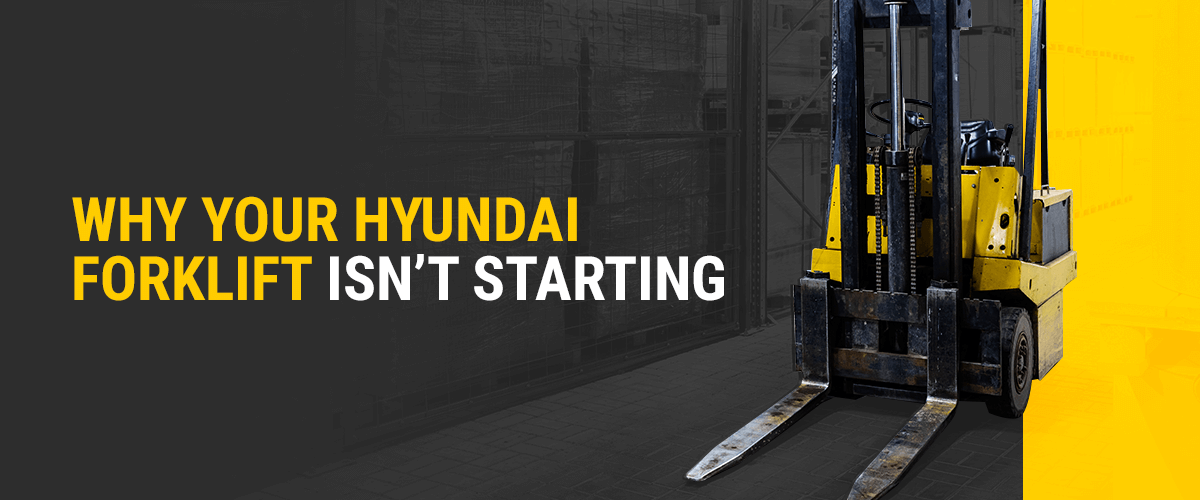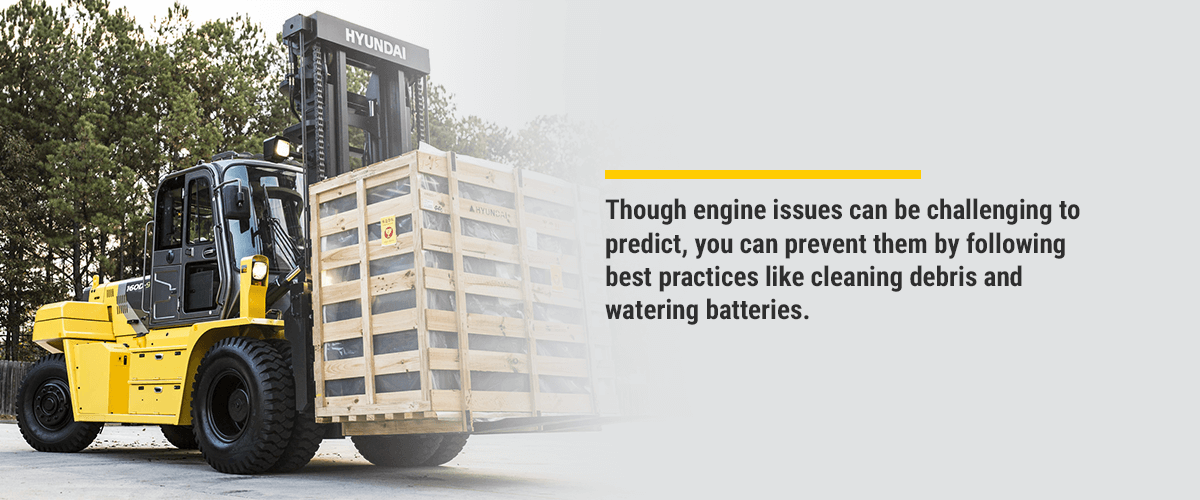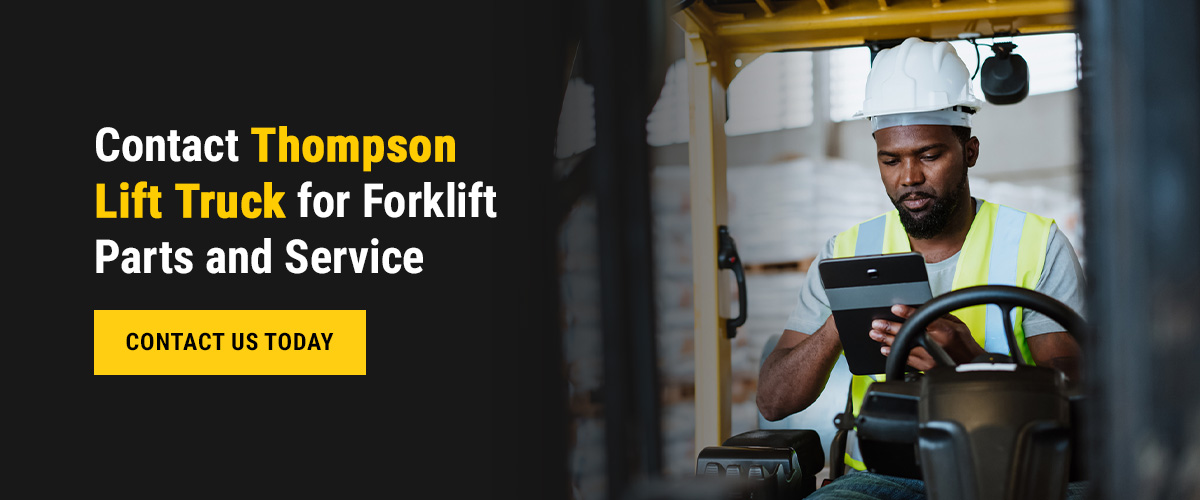
Why Your Hyundai Forklift Isn’t Starting

The last thing you need at the start of a busy workday is a Hyundai forklift that won’t start. An inoperable lift truck can be frustrating, especially if you don’t know how to repair a forklift. Understanding the causes of forklift problems and how to troubleshoot lift truck breakdowns can help you get your equipment up and running on your own or with a professional repair.
Common Reasons for Forklift Starter Problems
Your Hyundai forklift may refuse to start or break down for several reasons. The most common causes of forklift problems are:
- Fuel source: The forklift may not be getting adequate fuel, which can cause engine problems. For electric forklifts, operating for a long time between charges or incorrectly connecting the charger to the lift truck can cause issues. For internal combustion (IC) forklifts, problems can arise from letting the fuel sit in the tank for a long time or not getting a completely new tank of fuel.
- Battery: Battery problems can cause the lift truck to function incorrectly. Dead batteries, malfunctioning fuses and plugs, and corroded connections prevent the forklift from supplying enough power to the starting mechanism.
- Weather conditions: Exposure to cold can prevent a forklift engine from turning over right away. Cold temperatures can thicken battery electrolytes, freeze fuel regulators, and affect fuel performance.
- Safety features: Some safety features prevent the forklift from operating like normal. Your forklift may refuse to start if you accidentally turned on your emergency power-off switch the last time you used it. You also may not have activated the seat switch that turns on when weight is in the seat.
9 Forklift Issues and How to Fix Them
Mechanical issues can make the machine unsafe to operate, which is why forklift checks are a legal requirement before and after every shift. Basic troubleshooting can help forklift operators and warehouse managers identify the issue, which they may be able to fix on their own. The following guide will take you through nine common problems and how to fix them.
1. Forklift Won’t Start
Several factors can determine how to start a forklift again after it refuses to turn over:
- Fuel: For electric forklifts, ensure the battery has a full charge. If you have an IC forklift, make sure you have enough fuel in the tank. You can also try completely changing out the fuel for a new batch and checking the oil level.
- Temperature: If the battery charge and fuel levels are good, cold weather might be the issue. Move the forklift to a warmer environment and let the machine warm up before attempting to start it. Store your forklifts indoors or under shelter year-round.
- Mechanical: If forklift start-up issues persist, you can schedule a forklift starter replacement.
2. Forklift Runs Rough
A forklift that loses power, backfires, and sputters is running rough. Potential causes of rough operation include:
- A dirty throttle body.
- Regulator leaks.
- A weak or dead battery.
- Vacuum hose leaks.
- Broken wires.
- A blocked fuel filter.
Try cleaning the regulator and throttle body and replacing the fuel filter to help your forklift run smoother.
3. Forklift Check Engine Light Is On
The check engine light indicates a mechanical problem that could prevent the lift truck from starting. A variety of factors can trigger the check engine light, including:
- Bad wires.
- Bad sensors.
- Bad switches.
- Bad contacts.
- Incorrect fuel and air mixture.
Check your user manual or the Hyundai website for guidance about what could cause the check engine light to activate. Hyundai forklift fault codes on the digital display panel also indicate the cause of engine issues.
Though engine issues can be challenging to predict, you can prevent them by following best practices like cleaning debris and watering batteries.
4. Forklift Forks Won’t Lift
When your forklift forks won’t move, take these steps to troubleshoot the problem:
- Check the hydraulic fluid: The forklift cannot power the mast without adequate hydraulic fluid. Check the hose and cylinders for leaks and add more fluid if needed.
- Look at the forklift chains: Inspect the forklift chains for rust, wear, or damage. If you see problems, schedule a forklift chain replacement.
- Inspect the hydraulic system filters: Dirt and debris can prevent hydraulic fluid from flowing properly. Inspect and clean the pump filters and test the filter function.
- Clean the mast channels: Debris in these channels can create friction and wear. Clean and lubricate the channels for smooth operation.
5. Forklift Battery Is Losing Power
The battery is the forklift’s power source, and a malfunctioning battery can cause start-up issues. After disconnecting the battery, inspect the connections for corrosion. Next, reconnect the battery and try using non-engine parts like the horn. If those parts work, you may have a malfunctioning plug or fuse. If they don’t work, you need to replace the battery. Prevent battery problems by following proper battery maintenance, like regular charging and watering.
6. Forklift Accessories Stop Working
Lift truck accessories like horns, lights, and alarms can become damaged when the forklift breaks down or fails to start. Accessories may stop working due to:
- Blown lightbulbs.
- Dirty contacts and pins.
- Broken wires.
- Malfunctioning assemblies.
- Blown fuses.
Clean and maintain these parts regularly to keep your forklift’s accessories working. Clean the electrical contacts, lubricate parts to reduce wear, and replace blown bulbs right away.
7. Forklift Components Are Leaking
Stress and wear and tear can cause leaks in forklift components like hoses, O-rings, and clamps in the drivetrain, cooling, and hydraulic systems. If your forklift is leaking fluids, inspect the hoses for signs of wear and replace any damaged ones you find. Check these components regularly to spot and correct these issues early.
8. Forklift Has Electrical Problems
Electrical malfunctions in a forklift are typically the result of:
- Broken wiring.
- Corrosion.
- Malfunctioning switches.
- Blown fuses.
- Loose hardware.
Keep your electrical system in its best shape by ensuring the components stay dry and clean. Tape over any low-hanging or exposed wires to protect them.
9. Forklift Is Overheating
Cooling problems in a lift truck are a serious concern because excessive heat can damage drivetrain components. Cooling systems can fail due to:
- Broken water pumps.
- Loose hose clamps.
- Bad radiators.
- Broken hoses.
- Bad thermostats.
Clean the debris and dust off the system components to restore your cooling system. Be sure to clean these parts regularly to prevent more buildup.
Contact Thompson Lift Truck for Forklift Services Today
A certified forklift technician like Thompson Lift Truck can fix any problem with your Hyundai forklift’s operation. As an experienced team, we’ve seen many types of forklift breakdowns and have the tools and techniques to get your forklift back in working order. Consider our team an extension of yours.
Contact Thompson Lift Truck to schedule your forklift repair today.


